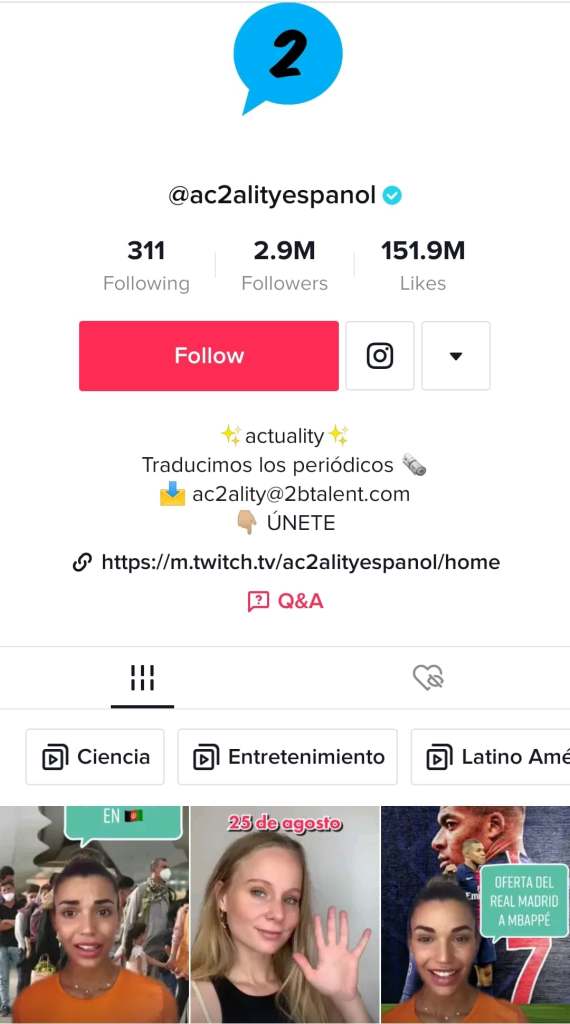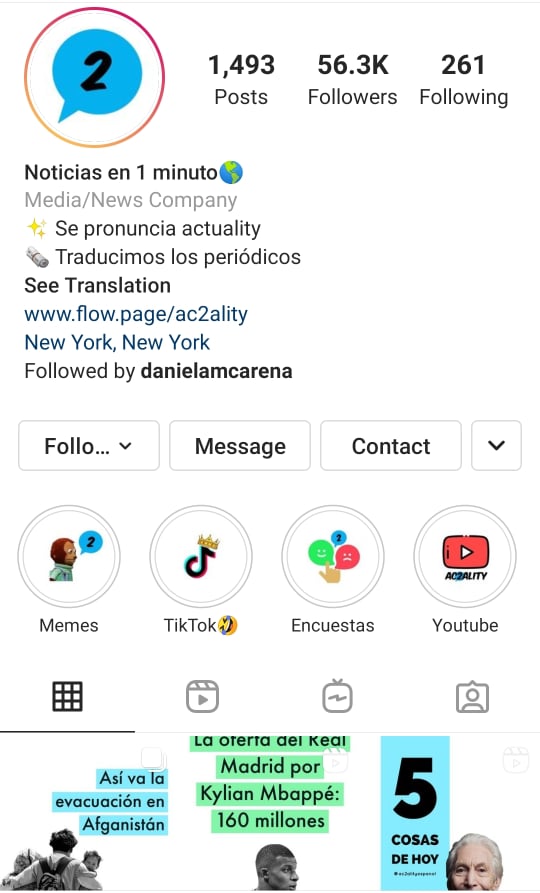|
Getting your Trinity Audio player ready...
|
The media start-up has taken a lead in news on TikTok. Even top legacy will struggle to catch up.
The scale and reach of Tiktok, especially among youth, is astounding. Yet many publishers are struggling to crack the code of its bite-sized videos.
In little over a year media start-up Ac2ality became Europe’s biggest news producer on TikTok. The Fix spoke to its founder Daniela McArena about the story behind Ac2ality, how TikTok is changing, and her plans for the future.
Social media is an increasingly important source of news. According to the Reuters Institute for the Study of Journalism Digital News Report 2021, in many European countries over half the audience uses social networks as a news source. Of these, TikTok is the fastest growing, especially among young audiences – reaching 24% of under-35s (although just 7% use it for news).
This has sparked a growing interest in the platform among publishers. But few have managed to find the right format. Media start-up Ac2ality’s Spanish language TikTok account, Ac2alityespanol tops the list at an impressive 2.9 million followers – more than the Washington Post and BBC combined!
Seizing the moment – Ac2ality’s origin story
Two years ago, McArena was working for the Spanish Embassy at the United Nations in New York. She was in charge of compiling news reports for her colleagues. Big topics back then included Brexit and Venezuela’s political crisis during Maduro’s presidency.
Her work required her to constantly keep track of ongoing events, which meant reading a lot of newspapers and following legacy publishers. But this was also a source of frustration – according to McArena, newspapers “wouldn’t provide enough context and explanation”.
Moreover, the format was ill-suited for the digital world. Often articles were long, would get lost in details and obscure jargon. Meanwhile, younger generations needed clear definitions regarding political and social terminology.
McArena decided to experiment with charts as a way to summarize the main events in the world of politics, but the response was lacklustre. She then decided to launch Ac2ality, a media for Generation Z on TikTok that would cover news in a quick, concise and comprehensive manner. It worked – Ac2ality quickly started attracting thousands of followers each month.
“We try to find the right balance between entertainment and politics, while politics is our main focus by all means. When we did entertainment and covered celebrities’ lives, our audience was disappointed, claiming that was not the type of news they expected from us.”
Making serious content work on TikTok
TikTok initially gained its fame with lip-syncing and dancing videos – entertaining for some, but hardly the serious atmosphere most traditional publishers seek. As a result, most ended up recutting snippets from their news programs (which didn’t work on TikTok), or tried to be funny (BBC cuts out gags from its comedy shows). But it almost always ended being cringy.
(Note: the great exception to this was the Washington Post’s “TikTok guy” Dave Jorgenson, who basically created a new style of reporting that mixes trending sounds, memes, and hard news).
But for Ac2ality it was a different story. According to McArena, Ac2ality was one of the first news publishers on TikTok predominantly focused on international politics. Occasionally, it experimented with more entertainment-focused themes, but audiences didn’t bite.
“We try to find the right balance between entertainment and politics, while politics is our main focus by all means”, McArena told The Fix. “When we did entertainment and covered celebrities’ lives, our audience was disappointed, claiming that was not the type of news they expected from us”.
Business model and plans for expansion
Like other social platforms, TikTok has been wooing content producers with it’s $200 million (planned to grow to $1 billion) creator fund, which essentially pays popular accounts for producing videos. Unfortunately, McArena explains, Ac2ality is not eligible – TikTok only supports individuals, not companies.
They have had more luck with investors, though. In order to secure capital for growth, McArena sold 49% of the company’s equity at a 1.6 million euro valuation to a Spanish venture capital firm. “It was a bit soon, but it allowed us to keep going,” she commented.
Additionally, Ac2ality has been publishing native ads, including sponsored content by Amazon Prime Video, and works with several outsource sales partners who bring in projects on a commission basis. McArena maintains that the team is open to cooperation with larger media outlets.
Ideas about editorial expansion also loom large. This includes adding more science and sports coverage and working on building up the English language version – the latter is still tiny compared to the Spanish language one, which is made up of roughly 50% Spain-based audiences, the rest coming from Latin America.
Adding more social media presence – especially Instagram – is also important for McArena, not least because of risk issues. TikTok is unpredictable, and they need more touchpoints with their audiences. (At 56K vs. 2.9M, Instagram in Spanish vs. TikTok in Spanish, there is still a long road ahead).
TikTok’s future as a news channel
When TikTok first started growing in Western markets many were worried about data privacy and censorship (being from China didn’t really help). Turns out, at least part of those concerns were merited. According to McArena, Ac2ality frequently saw its videos taken down (and always created back ups as a result).
“They erased our videos many times. Initially almost one in three videos was removed. We were not allowed to publish content on Hong Kong, Taliban, marihuana or sex. It is getting better but they are still quite strict”, she explained.
Things are changing, though, McArena adds, noting that not only is censorship falling – TikTok is also emphasizing more high-brow content. The platform became a sponsor of major events taking place around the globe, including the Olympics. As a result, brands that earlier stayed away from TikTok are now chasing the platform.
“They erased our videos many times. Initially almost one in three videos was removed. We were not allowed to publish content on Hong Kong, Taliban, marihuana or sex. It is getting better but they are still quite strict.”
McArena admits that the increasing competition on TikTok significantly reduced the number of daily followers of Ac2ality. However, the growth is slowing for everyone which makes her think that Ac2ality will retain the lead. “BBC will never reach the same number of followers as we do”, she stated.
But given the slowing growth and worries about unstable policies, the Ac2ality team plans to expand further on other platforms, including Twitch and Youtube. McArena noted that Youtube has staying power, making it an important platform for video creators to be. But she gets more excited about Twitch, an increasingly popular platform. For her, it is the “future television”.
This piece was originally published in The Fix and is re-published with permission. The Fix is a solutions-oriented publication focusing on the European media scene. Subscribe to its weekly newsletter here.





